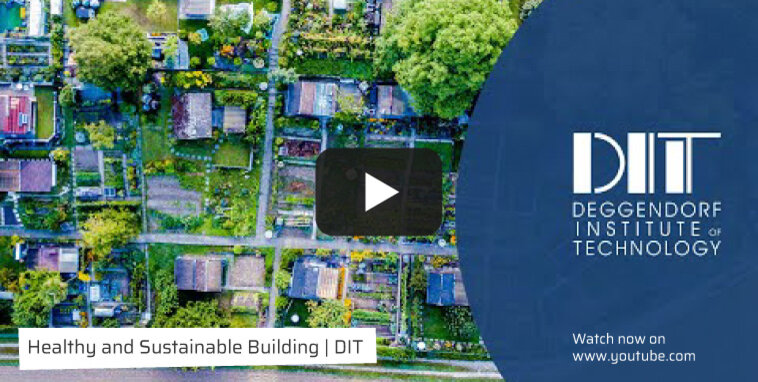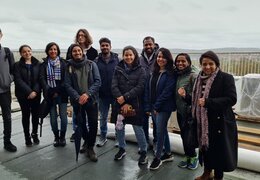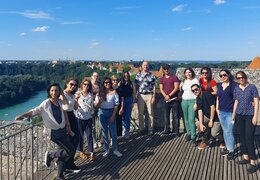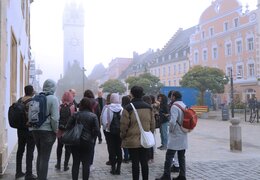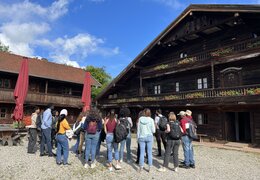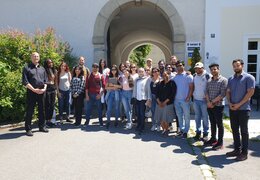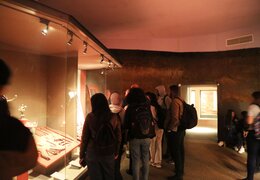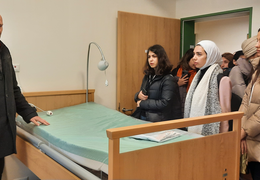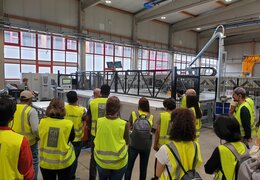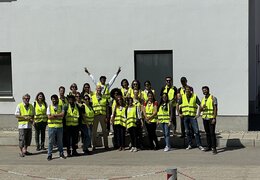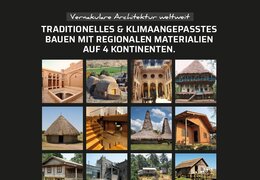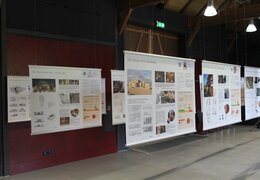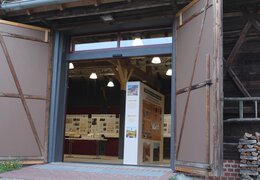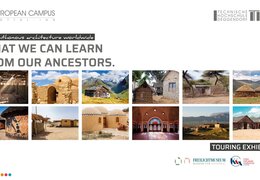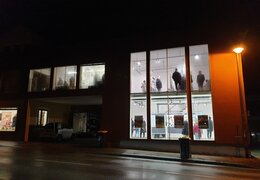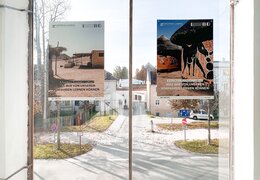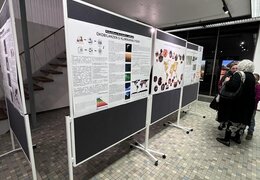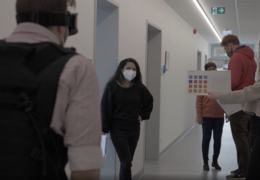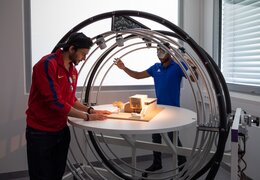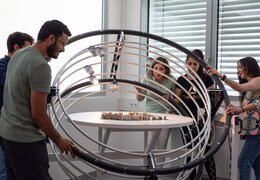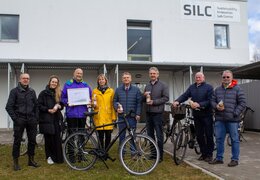create an environmentally friendly future
become a specialist in the development of sustainable buildings
We provide support for internships, starting a job in a company, or setting up your own business

create an environmentally friendly future
With this Master's degree you will gain the qualifications and skills for an international career in the future-orientated sector of healthy and sustainable buildings.
This postgraduate course qualifies students in methods and technologies in the fields of healthy and sustainable buildings, combined with applications in various areas of the construction and real estate industries. It acknowledges and broadens students' existing knowledge from undergraduate courses, such as construction engineering, architecture, technical building equipment, energy-efficient construction or related courses, and professional work experience.
While most of the international graduates continue living and working in Germany as architects or engineers in this specific field of competence, students are trained for developing sustainable solutions in all climate zones and different cultural backgrounds.
All professors have a very solid academic and professional background, including international award winning projects.
The Healthy and Sustainable Buildings degree programme is an official cooperation partner of the German Green Building Council (DGNB).
Learn more: Presentation video of the study program from the Master Info Evening
All the important information at a glance: Take a look at this brief introduction to the master's programme Healthy and Sustainable Buildings.
fact sheet healthy and sustainable buildings
Degree: Master of Engineering (M.Eng.)
Duration: 4 semesters (2 years)
ECTS points: 120
Start: March (summer semester)
Location: European Campus Rottal-Inn, Pfarrkirchen
Taught in: English
Application period: 01 October - 15 January
Admission requirements:
- Completion of an undergraduate study programme at a university in Germany or abroad which encompasses at least 180 ECTS credits in the fields of civil or environmental engineering, or architecture, or a qualification equivalent to a university degree of this nature. Please see the study and exam regulations (paragraph 3 "Qualification for Academic Studies")
- A successfully completed admission test - written test and interview (more details to follow soon)
- Written test: 20. January 2026
- Interview: 26. & 27. January 2026
- The exact time will be announced in the invitation letter for the aptitude test, which will be sent out after the application deadline.
- Details of the test cannot be disclosed in order to ensure equal conditions for all candidates.
- Language requirements
Application procedure:
Tuition fees:
- No tuition fees, only student union fee
- International students from non-EU/EEA countries are required to pay service fees for each semester. Click here to read about our service fees.
FAQs: An overview of the frequently asked Questions and Answers
Course Director: Prof. Dr.-Ing. Michael Laar, M.Eng., architect
Contact:
- General info on studying at DIT: prospective student advisors
career prospects
Graduates of the "Healthy and Sustainable Buildings" postgraduate degree are competent specialists in the field of healthy buildings and healthy living conditions, in material selection and product development or selection throughout the construction and interior facilities, and technical planning and construction including renovations and restorations.
Additionally, there are fields of work in the digitalisation and automation of healthy and sustainable buildings allowing for modern material flow, during the entire life cycle of buildings up to their demolition.
Graduates have career prospects in:
- Planning and design
- Product development
- Building management
... in the recycling and restoration branch and the smart home sector.
The need for material and energy resources and the increasing complexity of modern living and working spaces pose high challenges for achieving the objectives of sustainable development, particularly in the construction industry. In addition to health and quality, these include a certain level of comfort and the attractive design of age-appropriate living spaces.
The aim of the "Healthy and Sustainable Building" course is to impart the specific skills required for the energy-saving, resource-saving, healthy and modern requirements of an industrial society.
The course is aimed at people who see their future professional activity in the planning and construction of buildings as well as in competent support in their use and operation. Further opportunities arise in the sustainable development and planning of healthy and energy-efficient materials and technologies for sustainable buildings.
Due to the diverse requirements that arise in the field of healthy and sustainable construction, this master's programme is designed for a total of 4 semesters (3 study semesters and 1 semester master's thesis). This ensures that graduates are perfectly prepared for the complex challenges in their working lives.
All lectures will be held in English, thus proficiency in the English language is an essential prerequisite. The following modules build the core of the study programme:
Sustainable buildings:
The materials used for construction form the essential basis of sustainable buildings. It is important to use building materials that are harmless to health in order to avoid harmful substances (e.g. emissions of solvents) or biological impairments (e.g. mould formation). Building physics and smart building technology also play an important role here. Knowledge of the aspects relevant to chemistry, building biology and building physics form the basis for the design of sustainable buildings.
Evidence based and simulation based design:
Knowledge about the environmental-hygienic and medically verifiable influences of buildings on health and well-being, environmental-psychological aspects as well as technical-analytical methods for the proof of possible loads, form the base of an evidence-based design of sustainable buildings. Based on experiences in the field of effects of materials, technologies and interior design, approaches for integral planning and design of sustainable buildings are introduced. The building envelope as well as the interiors play an important role. Modern IT-supported methods support the scientific and technical design of sustainable buildings.
Sustainable and smart building systems:
Modern societies use intelligent technologies for the energy-saving management of buildings, which are increasingly being equipped with technologies that technically support working and living in buildings. The state of the art in the field of sustainable building management systems and ambient living is the content of the advanced training in the Master Healthy and sustainable Buildings. Other aspects are refurbishment and renovation as well as building safety and sustainable protection.
Research & methodology:
Great importance is attached to the scientifically exact qualitative and quantitative evaluation and evaluation of findings. In an R&D project as well as in the master's thesis, current topics are dealt with in cooperation with industrial partners.
Softskills and legal aspects:
In addition to the scientific-technical standards, relevant legal standards and framework conditions are taught. For the successful implementation of sustainable building planning and its implementation on the construction site, project management skills round off the profile of a graduate of the Healthy and Sustainable Buildings degree programme.
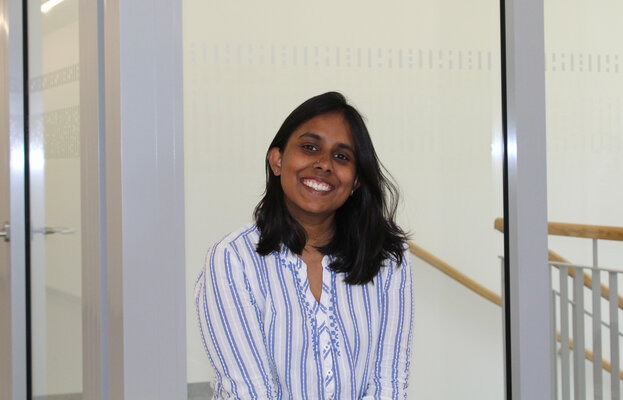
We have the best professors who are very open to answering all our questions and helping us in every way with our studies and providing us with all relevant information for our studies. Apart from that, the support staff at ECRI is quick and always willing to help. We also have had a lot of excursions during our course, as well as from campus, where I learned a lot about Germany and the local culture.
Lekshmi, Student Healthy and Sustainable Buildings
Excursions, projects and more
The following slides show what you can expect from the study degree and which student projects, trips or excursions other than lectures.
Varied site and building visits, city tours, as well as exhibition and museum visits are one part of the programme of the Healthy and Sustainable Building degree programme.
- During the construction site and building visits, the students can deepen their theoretically acquired knowledge through practical experience. For example, the students were present when a BlowerDoor test was carried out in the student residence, which was under construction at that time. On another excursion, the students had the special opportunity to visit the newly completed senior citizens' centre in Pfarrkirchen before the residents moved in.
Press release
- The joint visits to historical towns in the immediate and wider surroundings of the study location show both international and local students more about the region in which they study. Visits include Passau, Straubing and Burghausen. On guided city tours, the students learn about the (architectural) history of the historic city and visit important buildings.
Press release
- Visits to exhibitions and museums, such as the open-air museum in Massing, the exhibition "Renewable raw materials" or the Gäubodenmuseum in Straubing, enable the students to learn a lot about the cultural background of regional architecture and thus draw conclusions for their own designs.
Press release
Visits to companies and trade fairs integrated into the study programme enable students to experience company and construction processes, get to know innovative products and projects, and find out what is being done in the area of sustainability. They can also make initial contacts and gain insights into a potential future employer.
- Visits will be made to regionally based companies such as the globally active Lindner AG (leading specialist in the fields of interior fittings, façade construction and insulation technology), the Haas Fertigbau company, the ZAW Außernzell waste disposal site and the Schlagmann company (manufacturer of the world's best purely mineral, highly insulating bricks).
Press release
- During the trade fair visits, the students learn about innovative products in the construction sector. These include, for example, visits to "BAUMA", the world's leading trade fair for construction machinery, the Heim+Handwerk trade fair, the Intersolar trade fair or BAU, a trade fair for architecture, materials and systems.
The result of one task in the first semester – the analysis of typical vernacular architecture of the student’s region, including a life cycle assessment – was transformed in the first exhibition in 2022, then in the Glashaus in Pfarrkirchen. The following year, the exhibition was hosted at the “Freilicht Museum Massing”, an open-air museum of traditional regional farmhouses. The results were also published in book.
In 2025 the original exhibition gained 32 additional projects from around the world, for a third exhibition at the “Freilandmuseum Bad Windsheim”. A new book was also published.
The exhibition shows sustainable, regionally unique architecture from the different home countries of the students, which are spread all over the world. In connection with this, a life cycle assessment was shown, comparing the environmental impact of traditional construction methods with modern construction methods, as well as a comparison with the climate of the study location Pfarrkirchen.
During regular laboratory days and experiments, the students can, for example, experience first-hand what it means to sit in a wheelchair, or try out the limitations of old age with the help of an age simulation suit. The lab is also equipped with a heliodon, which the students can use to check and analyse their designs in terms of light and shadow.
HSB does not only teach certification systems as part of the module “Standards & Green Buildings Certifications Systems” in the second semester through accredited professionals in various systems, it also coordinated the successful certification of the EU-wide certification “Bicycle-friendly employer” of our ECRI-Campus.
on 15 March, the certificate in silver as "Bicycle-friendly employer" was handed over to our Campus by the ADFC (Allgemeiner Deutscher Fahrrad-Club | General German Bicycle Club), the certification entity for this European Union Certificate.
In record time – 9 months instead of the usual 2 – 3 years - our team implemented many different solutions in order to facilitate and promote the use of bicycles as healthy and sustainable mobility alternative. The campus purchased high-quality bicycles and helmets for our staff, improved the parking facilities, provided access to shower and locker facilities, extended the existing bike-station, developed routes and plans of the surroundings, between many other interventions out of a possible total of around 50 criteria.
In the state of Bavaria our campus is the second to be certified and so far one of very few campuses in Germany.
A film crew from the Bayerischer Rundfunk filmed the event and interviewed students and staff.
Another important achievement for our Sustainability Campus!
subject overview
Overview of the courses (From the Study and Examination Regulations), Weekly Semester Hours (SWS) and ECTS (European Credit Transfer and Accumulation System) for the Master's degree Healthy and Sustainable Buildings.
| 1st Semester | SWS | ECTS |
| Environmental Psychology | 4 | 5 |
| Sustainable Buildings & Neighbourhoods | 8 | 10 |
| Smart Buildings | 8 | 10 |
| Quantitative and Qualitative Research Methods | 4 | 5 |
| 2nd Semester | SWS | ECTS |
| Environmental Hygiene and Medicine | 4 | 5 |
| Evidence Based Design 1 | 4 | 5 |
| Standards & Green Building Certification Systems | 4 | 5 |
| Building Performance Simulations | 4 | 5 |
| Sustainable Energy Supply Systems | 4 | 5 |
| Ambient Assisted Working & Living | 4 | 5 |
| 3rd Semester | SWS | ECTS |
| International Project Management and Implementation | 4 | 5 |
| Building Safety & Security | 4 | 5 |
| Evidence Based Design 2 | 4 | 5 |
| Refurbishment and Renovation | 4 | 5 |
| Evidence Based Design – Consolidation (FWP) | 6 | 5 |
| Selected chapters Healthy & Sustainable Buildings & Neighbourhoods (FWP) | 4 | 5 |
| Smart Infrastructure & Artificial Intelligence (FWP) | 4 | 5 |
| R&D Project | 6 | 5 |
| 4th Semester | ||
| Master's Thesis incl. Presentation | - | 30 |
Official cooperation partner of the study programme:

